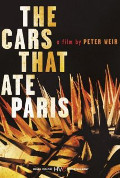
Directed by
Peter Weir
91 minutes
Rated M
Reviewed by
Bernard Hemingway

The Cars That Ate Paris
Synopsis: Arthur (Terry Camilleri) and his brother George are driving through rural New South Wales when they take a detour to the township of Paris. George loses control of the car which runs off the road. George is killed and Arthur wakes up in the Paris hospital. Despite his misgivings Arthur is convinced by concerned citizens to stay in Paris while he convalesces. Uneasily, he agrees.Peter Weir’s Picnic At Hanging Rock (1975) with its decorously restrained depiction of colonial Australia,widely regarded in its day as exemplary of our cinematic identity. Its precursor, the director's 1974 debut, The Cars That Ate Paris, is the antithesis of that film. Scripted by Weir from a story credited to himself, Keith Gow and Piers Davies it is a raucous, wonderfully eclectic mix of horror, pitch-black comedy with a dash of Spaghetti Western and spiced with a sympathetically eclectic score by Bruce Smeaton (who won an AFI for it jointly with his score for The Great MaCarthy). It takes the stereotypical image of the sleepy Australian country town (it was filmed on location at Sofala, NSW) and its easy-going inhabitants and turns it on its head. Behind its façade of normality, Paris, NSW is the epicentre of creeping evil and its inhabitants, living ghouls.
From its disorienting opening parody of ingratiating advertisements of the time, the film maintains a wickedly off-beat humour and eccentric vitality culminating in an orgy of destruction as the repressed tension of the town’s double life explodes. Yes, there are narrative loose ends all over the place including a rather inconclusive ending but such untidiness is hardly inconsistent with the spirit of the film.
The excellent cast includes John Meillon, who turns in a standout performance as the officious Menzies-era mayor, Terry Camilleri as the hapless outsider, Max Gillies, Bruce Spence and a young Chris Haywood, who gives an over-the-top performance as a local hoon.
Critically the film was well received in its day and it was one of the first Australian films to make an impact at Cannes. As a self distributed film (among other reasons) however it did not do well at the local box office, returning less than half of its $269,000 budget (it was released in the USA in 1977 with the misleading title of The Cars That Eat People). Whilst today the film still has a surreal quality its sense of humour has much in common with the contemporaneous parodic Barry McKenzie comedies and it remains a rough gem that will appeal more to a cult than mainstream audience.

Want more about this film?


Want something different?




